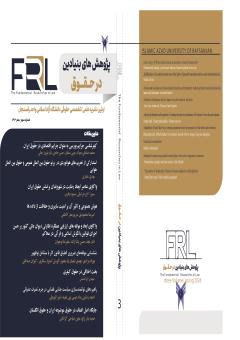Analysis and investigation of crimes related to medicine and treatment by medical and pharmaceutical professionals
Subject Areas :Samira tajkhorasani 1 * , masoud Bagheri 2
1 - استادیار گروه حقوق، دانشکده حقوق، دانشگاه ازاد اسلامی واحد رفسنجان، رفسنجان، ایران
2 - عضو هیئت علمی گروه حقوق دانشگاه ولیعصر (عج) رفسنجان
Keywords: Citizens' rights, social welfare, human dignity,
Abstract :
Today, one of the foundations of power and the need for the legitimacy of governments is to respect the rights of citizens and the satisfaction of citizens. Because in today's world, citizens are the most important social pillars of different societies. The most important task of officials and statesmen, which must be done in order to strengthen and improve an efficient and effective society, is to create citizenship and create satisfaction in citizens by providing the necessary facilities, facilities and mechanisms for citizens so that they can benefit from their citizenship rights. And to be able to perform their citizenship duties in a proper way towards the local community and the city they live in. Because nowadays, one of the main duties of every government is to ensure the welfare of the citizens. Social welfare appears in various civil, economic, social, political, cultural axes, right to food, housing and clothing, etc. Creating social welfare can provide the satisfaction of citizens. Citizens feel satisfied in the light of having social welfare and enjoying social protections based on social laws such as respect, right to self-determination, freedom of speech and press, freedom of opinion and religion, social justice, social security and consider the government as a welfare government. known Therefore, since social well-being in any society is one of the most basic social needs that society members must enjoy and well-being creates security, a sense of peace and security and all-round satisfaction of citizens regarding the present and the future, hence Today, one of the main tasks of every government is to provide the welfare of the citizens, which is largely established by the governments with the formation of new welfare institutions. The research method in the present study is descriptive-analytical.
الف)کتب
1-ایسوا. آلوین. (1378)؛ تغییر اجتماعی و توسعه، ترجمه محمود حبیبی مظاهری، تهران: انتشارات پژوهشکده مطالعات راهبردی، چاپ دوم.#
2-باری، نورمن. (1380)؛ رفاه اجتماعی، ترجمه اکبر میرحسینی و مرتضی نوربخش، تهران: انتشارات سمت، چاپ دوم.#
3-جعفری، امیر. (1392)؛ آزادی عقیده، جلد 1، دانش نامه عقايد اسلامي، چاپ دوم.#
4-شریفیان، جمشید، (1380)؛ راهبرد جمهوری اسلامی ایران در زمینه حقوق بشر در سازمان ملل متحد، چاپ اول، انتشارات مرکز چاپ و انتشارات وزرات امور خارجه، چاپ اول.#
5-کوشا، جعفر. (1381)؛ جرايم علیه عدالت قضايی، تهران: نشر میزان#
6-گودرزی بروجردی، محمدرضا. (1384)؛ سیاست جنايی قضایی، معاونت حقوقی و توسعه قضایی قوه قضائیه، نشر سلسبیل.#
7-نجفی ابرندآبادی، علی¬حسین. (1378)؛ تقریرات درس سیاست جنايی دوره دکتری، تهران: دانشکده حقوق دانشگاه شهید بهشتی.#
8-وکیل، امیرساعد و عسکری، پوریا. (1383)؛ قانون اساسی در نظم حقوقی کنونی، انتشارات مجد، چاپ اول.#
ب)مقالات
9-آل¬محمد، سید امیر. (1395)؛ تکریم ارباب رجوع و حقوق شهروندی، مجله حقوق عمومی عدالت، سال اول، شماره 1.#
10-ابراهیمی، مهدی. (1394)؛ نگاهی به پژوهشهای رفاه اجتماعی در ایران (با تمرکز بر مقالات علمی ـ پژوهشی در دوره زمانی 93-1380)، فصلنامه تأمین اجتماعی، سال سیزدهم، شماره 1، شماره پیاپی 46، ص 9.#
11-احمدپور، ایوب. (1387)؛ درآمدی بر مبانی حقوق شهروندی در اسلام، مجله پژوهش¬های اسلامی، سال دوم، شماره 3#.
12-پوراحمدي لاله، محمدرضا. (1382)؛ حق جبران خسارت، مجله دادرسی، شماره 37.#
13-حائری یزدی، مهدی. (1381)؛ اسلام و اعلامیه حقوق بشر، سالنامه مکتب تشیع، شماره 4.#
14-دوبنوا، آلن. (1388)؛ نظام تربیت شهروند، ترجمه بزرگ نادرزاده، ماهنامه کلک، شماره 25#
15-رستمی، ثریا. (1392)؛ حقوق شهروندی و آزادیهای مشروع، پژوهشنامه فقه اسلامی و مبانی حقوق، سال 1، شماره 1.#
16-روشن، محمد و دیگران. (1393)؛ حقوق شهروندی، پیشینه و جایگاه آن در مناسبات پلیس، مجله بصیرت و تربیت اسلامی، سال 11، شماره 30.#
17-رهنمود، فرج¬الله. (1384)؛ معماری سازمان دولت؛ گامی بنیادین در تکریم ارباب رجوع، مجله تحول اداری، شماره 49.#
18-شیانی، ملیحه. (1381)؛ شهروندی و رفاه اجتماعی، مجله رفاه اجتماعی، دوره 1، شماره 4.#
19-فقیهی، ابوالحسن. (1381)؛ نظام¬های پاسخگویی در بخش دولتی، دیدگاهی تطبیقی، فصلنامه مطالعات مدیریت، شماره 25.#
20-قوام، میرعظیم. (1389)؛ حقوق بزه دیدگان و خواسته هاي آنان از پلیس،فصلنامه انتظام اجتماعی، شماره 2.#
21-محسنی تبریزی، علیرضا. (1378)؛ بررسی زمینه¬های مشارکتی روستاییان و ارتباط آن با ترویج کشاورزی، ماهنامه جهاد، دوره 19، شماره 221-220.#
22-مولائی، آیت و گروئی ساردو، منیره. (1394)؛ نقش حقوق سیاسی شهروندی در قانون اساسی جمهوری اسلامی ایران و مدیریت جهانی، اولین کنفرانس بین المللی نقش مدیریت انقلاب اسلامی در هندسه قدرت نظام جهانی، تهران: دبیرخانه دائمی کنفرانس بین المللی حماسه سیاسی و حماسه اقتصادی.#
23-نیکزاد، عباس. (1382)؛ آزادی عقیده و مذهب در اسلام، مجله رواق اندیشه، شماره 18.#
24-هاشمی، سیدمحمد و همکاران. (1388)؛ حقوق شهروندی و توسعه شهری مشارکتی، مجله تحقیقات حقوقی، شماره 50.#
ج)پایان¬نامه¬ها
25-ابراهیمی، حسین. (1395)؛ مبانی فقهی و حقوقی رفاه اجتماعی، پایان¬نامه کارشناسی ارشد، دانشگاه قرآن و حدیث.#
26-اسدی، احمد. (1384)؛ بررسی عوامل مؤثر بر کاهش تمایل به مشارکت سیاسی و اجتماعی شهروندان کرد، پایان¬نامه کارشناسی ارشد، تهران: دانشگاه علامه طباطبائی.#
د) منابع لاتین
کتب
1) Allan M. Feldman and Roberto Serrano. (2006); Welfare Economics and Social Choice Theory, 2nd Edition, Springer Science Business Media, New York.#
2) Barbalet, J. M. (1988) Citizenship: rights, struggle and class inequality. Milton Keynes England: Open University Press.#
3) Bevilacqua, D. (2015); Introduction to Global Food-Safety Law and Regulation, Netherlands: Europa Law Publishing.#
4) Kovacheva, S. (2005) Keys to youth participation in eastern europe. Strasbourg: Council of Europe.#
مقالات
1) Bruni, Luigino and Guala, Francesco. (2001); Vilfredo Pareto and the Epistemological Foundations of Choice Theory, History of Political Economy. Vol. 33, No. 1.#
2) Chappell, Tim & Roger. Crisp. (1998); Utilitarianism, in Craig Edward, Routledge Encyclopedia of Philosophy, London, Routledge, 1st, Vol. 9.#
3) Daems, T. (2007); Engaging with penal populism: The case of france, punishment and society, vol. 9 (3). #

